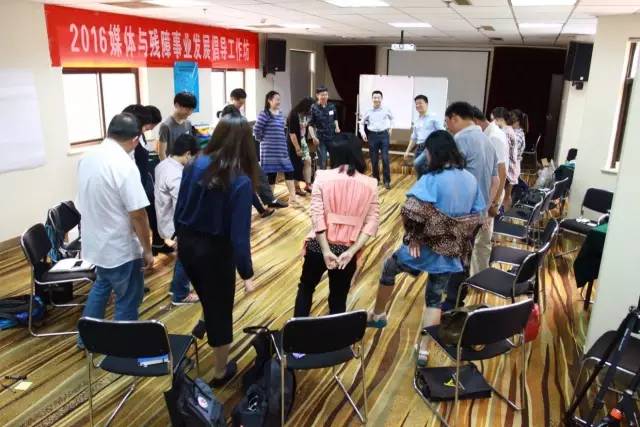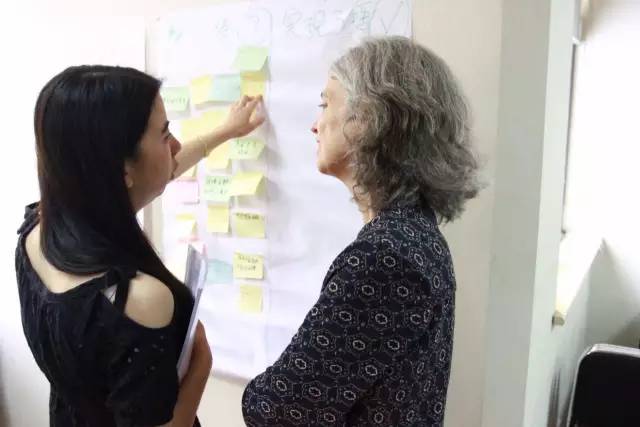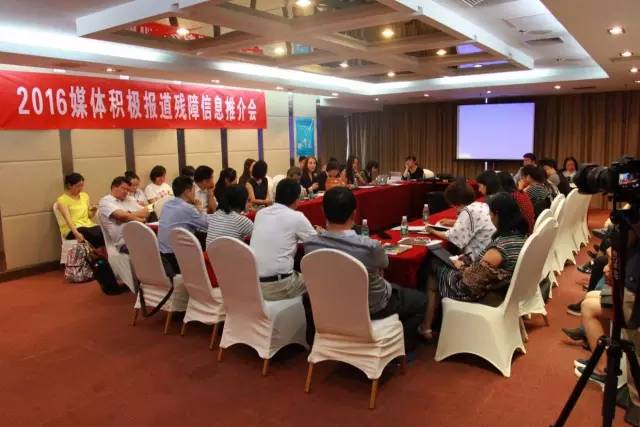
残障人士是社会的负担吗?他们希望得到怎样的对待?哪些有关残障的表达用在新闻报道中是可以被接受的?媒体是否反映了残障人士的真实需求?没有残障人士的参与,旁人是否有资格为他们做决定?2016年6月7日至8日,由有人文化、全国心智障碍者家长联盟主办,联合国教科文组织、联合国国际劳工组织、国际助残支持的“2016媒体与残障事业发展倡导工作坊”在北京举行。为期两天的活动就包括上述问题在内的残障议题进行了深入讨论。
参加本次工作坊的共计40余人(包括女性28人),其中包括来自24家媒体机构的29位记者和新媒体从业人员。此外还有国际机构传播官员、残障组织代表和残障领域专家也一同参加了本次活动。为期一天半的残障平等意识培训(DET)通过生动活泼、目的明确、参与度极高的小组讨论形式,使参加者对平等权利、应享权益、社会包容与残障人士的社会参与、残障问题的内涵、残障与缺陷的体验以及基于人权的残障报导方式有了更为清晰的认识。

来自中国广东的记者梁健敏在讨论中指出,残障相关的新闻报导通常将残障人士两极化,要么讲述他们生活如何艰难,要么把他们塑造成‘身残志坚’的典型,而缺少对残障人士作为普通人角色的关注。梁女士所在的信息时报是广州日报下的一家都市报,报纸发行量为80万,微博微信矩阵约为300万。
培训期间,参加者从几篇媒体报道案例出发,就媒体如何加强社会对残障人士的尊重、重塑积极社会形象,从而促进其权力与社会包容,展开了广泛的讨论。《中国财经报》记者张瑶瑶结合自身的采访经验表示,在报道中过分放大残障人士的痛苦对他们没有好处。残障人士想要的不是他人的同情,他们只希望自己的事迹可以被如实地记录下来。

作为本次研讨会的一部分,媒体积极报导残障信息推介会于6月8日下午举行。联合国教科文组织驻华代表处主任欧敏行女士首先进行了发言。她在讲话中谈到,联合国和中国政府近日就未来15年的17个可持续发展目标作出联合承诺,残障问题就被列为其中一项重要的交叉问题。媒体有力量通过其传达的故事和形象影响思维方式、构建社会规范,因此也有责任根据联合国《残疾人权利公约》引导公众接受残障权利。欧敏行主任号召在场记者通过其所在的新闻机构和社交媒体促进对残障人士的尊重、平等和包容。

中国智力残疾人及亲友协会主席兼秘书长张宝林先生在发言中指出,每个人都有成为残障人士的风险,同样,每个人都有成为残障人士工作者的可能,对媒体从业者来说更是如此。张宝林先生此前曾是人民日报的一名资深编辑。他谈到新闻来源于事实,以事实为本,因此媒体从业者在采写报导前应当多学习有关残障的专业知识。
中国精神残疾人及亲友协会主席兼秘书长温洪女士指出,精神残障群体因其精神障碍,在新闻报道中经常被刻画成犯罪分子的形象。事实上,如果长期接受合理治疗,这种情况是非常少见的。她谈到近来几则有关孤独症儿童的新闻事件显示出家长乃至公众对孤独症相关知识的严重缺乏,并进一步澄清了对孤独症的几种常见误解。鉴于此,她认为必须加强针对精神残障群体的医疗与社区服务。
中国社会科学院法学研究所副研究员祁建建简要介绍了2016年3月1日起实施的《中华人民共和国反家庭暴力法》的落实情况,并就该法保护残障人士的部分进行了重点说明。
活动期间发布的《关于媒体积极报导残障的联合倡议》得到了参与本次活动记者的赞同。
本次“媒体与残障事业发展倡导工作坊”是一项由联合国机构在华开展的联合项目的一部分,得到了联合国促进残疾人权利伙伴关系的支持。该项目由联合国教科文组织、国际劳工组织、联合国开发计划署和联合国儿童基金会执行,与中国政府密切合作,为残障人士的权利与权益提供支持,同时促进《2016-2020年联合国在华发展框架》和中国“十三五”规划的落实。在该项目框架下,联合国教科文组织也为12385全国残疾人服务热线提供支持。自2015年开通以来,热线增强了公众获取与残障相关的法规政策和服务信息,潜在造福中国8千5百万残障人士和其家庭。
How to promote positive images of persons with disabilities and stimulate a climate of non-discrimination and inclusion through media reporting explored in Beijing
Are persons with disabilities burden of the society? How do they want to be treated? What expressions are acceptable in news reports on disability? Do the media reflect their actual needs? Do people have the right to make decisions for persons with disabilities without their participation? These were among the questions discussed during a two-day seminar on Media and Disability Advocacy. Held in Beijing on 7-8 June 2016, the seminar was co-organized by One Plus One Disabled Persons’ Cultural Development Center and Disability China, with the support UNESCO, ILO and Handicap International.
More than 40 people (28 women), including 29 journalists and new media practitioners from 24 newspaper and media outlets, as well as communication officers, Disabled Persons Organizations (DPO) representatives and disability experts participated in the seminar. During a one-and-a-half days’ Disability Equality Training (DET), the participants were sensitized to the equal rights, entitlement, social inclusion and participation of persons with disability, the implications of disability issues and the experience of disability and impairment, as well as disability reporting with a human rights-based approach, through a dynamic, focused and highly participatory group work.
Ms. Liang Jianmin, a news reporter from China’s Guangdong Province said during the seminar that “persons with disability are often polarized in our reports - they are either too miserable or made a moral model. Portray of persons with disabilities as regular people is somehow missing.” Ms. Liang works for Xinxishibao, a branch under Guangzhou Daily which has a circulation of 800,000, and 3 million followers of its social media account.
During the seminar, Participants discussed extensively, based on several media reports case studies, how the media can contribute to fostering respect and restoring positive images of persons with disabilities, in order to promote disability rights and inclusion. Ms. Zhang Yaoyao from China Financial and Economic News said that “too much emphasis on their misery cannot do any good to persons with disabilities. From my experience, they don’t want compassion from others. Sometimes a simple record of their story is all they want.”
As part of the seminar, a Media Briefing on the Promotion of Positive Media Reporting on Persons with Disabilities took place on 8 June. Opening the event, Dr. Marielza Oliveira, Director and Representative of UNESCO Beijing Office informed the participants of the joint commitment made by the United Nations and the Chinese Government recently on achieving 17 Sustainable Development Goals in the next 15 years, in which disability is one of the key cross-cutting issues. Since media images and stories have the power to influence thinking and establish social norms, it is also media’s responsibility to nurture public receptiveness to the rights of persons with disabilities, in accordance with the United Nations Convention on the Rights of Persons with Disabilities. Dr. Oliveira invited the journalists to spread the word through their news rooms and social media channels, to create more respect, equity and inclusion for persons with disabilities.
Chairperson and Secretary-General of China Association of Persons with lntellectual Disability and their Relatives, and former senior news editor from China’s Xinhua News Agency Mr. ZHANG Baolin noted in his presentation that everyone has the risk of becoming a person with disability; and equally, everyone has an opportunity to become a positive change maker for persons with disabilities, especially media professionals. He reminded that facts are the origin and essence of news, and encouraged journalists and media practitioners to acquire more knowledge and expertise on disability issues before writing about them.
Chairperson and Secretary-General of China Association of Persons with Psychiatric Disability and their Relatives, Ms. WEN Hong noted that persons with psychiatric disability are often unfairly portrayed as perpetrators of crimes in the media because of their mental health difficulties. In fact, it is rarely the case if they receive proper and persistent medical treatment. She further clarified some misconceptions regarding autism, drawing from several recent events concerning children with autism which were heavily reported in the media, showing a serious lack of understanding and knowledge of autism by their parents and the general public. She stressed that it is therefore very important to enhance the medical and community services provided to persons with psychiatric disability.
Professor Qi Jianjian from the Chinese Academy of Social Sciences made an introduction of the implementation of the Family Violence Law in China, which entered into force as of 1 March 2016, with a focus on protection of persons with disabilities guaranteed by the Law.
During the event, a set of Guidelines on Promoting Positive Media Reporting on Persons with Disabilities were also endorsed by the participating journalists.
The seminar on Media and Disability Advocacy is organized as part of a joint UN programme in China, supported by the UN Partnership to promote the Rights of Persons with Disabilities. Implemented by UNESCO, ILO, UNDP and UNICEF, in close collaboration with the Chinese government, the programme provides support to the rights and entitlement of persons with disabilities, contributing to the United Nations Development Assistance Framework (2016-2020) and China’s 13th Five Year Plan (2016-2020). Within the same programme, UNESCO has also been providing support to a national hotline 12385 for persons with disabilities. Launched in 2015, the hotline increased access to information on laws and policies regarding the equal rights and available services for persons with disabilities, with the potential of benefiting the 85 million women and men with disabilities and their families in China.
中国智力残疾人及亲友协会 China Association of Persons with Intellectural Disability and their Relatives
地址:北京市西城区西直门南小街186号 邮编:100034 电话/传真:010-66580064 电子邮箱:zhgzxbgs@163.com zbl47331@sina.com
中国智协 版权所有 Copyright © 2014 CAPIDR,All Rights Reserved 京ICP备13052643号-1 网站建设:北京传诚信